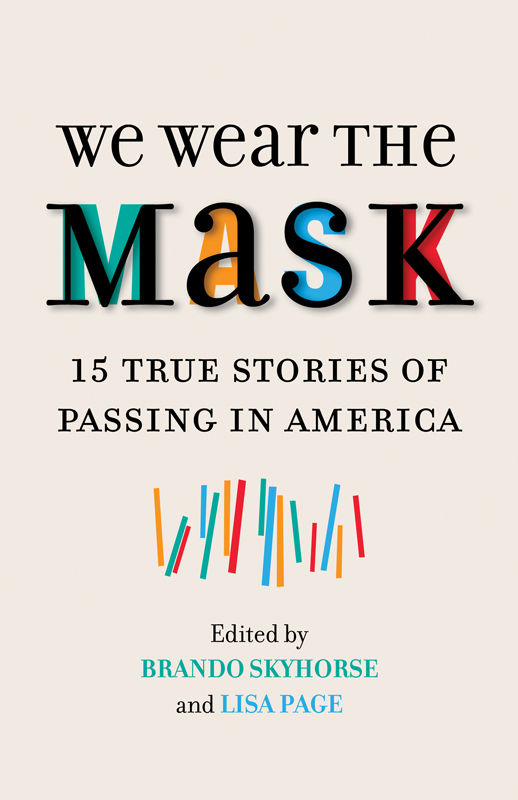
We Wear the Mask
15 Stories About Passing in America
کتاب های مرتبط
- اطلاعات
- نقد و بررسی
- دیدگاه کاربران
نقد و بررسی

Starred review from August 1, 2017
The act of passing, and its many permutations, is the subject of 15 superb essays in this collection edited by Skyhorse (English, Indiana Univ.; Take This Man: A Memoir) and Page (English, George Washington Univ.). Beginning with Skyhorse's description of his experiences passing as Native American at the insistence of his mother, contributors explore the circumstances--some intentional, others accidental--that led them to pass as a member of another race, religion, sexuality, or class. The authors come to various conclusions about the nature of the act of passing, as well as its impact upon the individual and society as a whole. Contributor Marc Fitten discusses the decontextualization inherent to passing, while Clarence Page recognizes class passing as something akin to an American tradition. There is value to be found in each essay, but particular highlights include author Rafia Zakaria's description of the acts of passing required to get through airport security as a Muslim American, while writer Gabrielle Bellot, in a beautiful essay about passing as a cisgender woman, emphasizes how transgender individuals use passing as a means to be recognized as their true, authentic selves. VERDICT Highly recommended for readers interested in American sociological issues and current events.--Sara Shreve, Newton, KS
Copyright 2017 Library Journal, LLC Used with permission.

August 1, 2017
The act of passing, and its many permutations, is the subject of 15 superb essays in this collection edited by Skyhorse (English, Indiana Univ.; Take This Man: A Memoir) and Page (English, George Washington Univ.). Beginning with Skyhorse's description of his experiences passing as Native American at the insistence of his mother, contributors explore the circumstances--some intentional, others accidental--that led them to pass as a member of another race, religion, sexuality, or class. The authors come to various conclusions about the nature of the act of passing, as well as its impact upon the individual and society as a whole. Contributor Marc Fitten discusses the decontextualization inherent to passing, while Clarence Page recognizes class passing as something akin to an American tradition. There is value to be found in each essay, but particular highlights include author Rafia Zakaria's description of the acts of passing required to get through airport security as a Muslim American, while writer Gabrielle Bellot, in a beautiful essay about passing as a cisgender woman, emphasizes how transgender individuals use passing as a means to be recognized as their true, authentic selves. VERDICT Highly recommended for readers interested in American sociological issues and current events.--Sara Shreve, Newton, KS
Copyright 2017 Library Journal, LLC Used with permission.

August 15, 2017
Writers explore how and why the phenomenon of "passing" both shocks and fascinates.Skyhorse (English/Indiana Univ.; Take This Man, 2014, etc.) and Page (Creative Writing and English/George Washington Univ.) assemble a collection of 15 authentic narratives about how people attempt to "win access to the specific life they want, the ultimate form of assimilation, the pure embodiment of the American Dream," by assuming to be a class or race they are inherently not. Both of the editors know this particular form of "reinvention" well and contribute their perspectives in highly personal essays. Skyhorse, who received his name from his mother "after my Mexican biological father abandoned us," opens with reflections on how he, as a Mexican-American with the surname Ulloa, passed himself as an American Indian on his college applications. Page chronicles how her black great-grandmother passed for white in Mississippi in order to get a college education. The editors agree that "each of us sometimes employs misdirection to let someone jump to a different conclusion about who we are." Racial passing also plays a key role in Achy Obejas' tender recollection of how her Cuban-born father reinvented his "Third World soul" to create a better future for his family in America and in Marc Fitten's excavation of his familial roots as an urgent preventative tool against diseases predisposed to Asian culture, which his great-grandfather went to great lengths to blur. Class-crossing comes into play in poet Patrick Rosal's address to a woman who mistook him for a waiter at the National Book Awards. Sexuality passing became tantamount when M.G. Lord suppressed her lesbian leanings in favor of "appropriate feelings towards men" while at Yale, until she fell in love with a woman. In presenting these insightful, provocative life experiences, the editors give inquisitive readers (some of whom may be passing themselves) nutritious food for thought. Other contributors include Margo Jefferson, Susan Golomb, and Sergio Troncoso. Sharply drawn reflections on identity fluidity, stereotypes, marginalization, and cultural assumption.
COPYRIGHT(2017) Kirkus Reviews, ALL RIGHTS RESERVED.

























دیدگاه کاربران